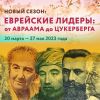Last week, Booknik read about a judge’s fate, marriage arrangement complications for ultra-orthodox (and just religious) girls, and intricate relations of Jews and their Jewishness. He also discovered a new language in poems by a Kharkov poet, leafed through an old Jewish cookbook, looked for Israeli rural cuisine (successfully), wrote a love-letter, learned how to cook charoset, and crème brûlée, laughed at a Knesset member, and watched how children treat their younger siblings. Meanwhile, Booknik Jr. learned some Pesach songs, trained to cook for the same holiday, read a Jewish folktale, and Shakespeare, and then he watched a cartoon about a real space adventure.
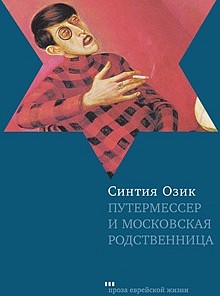
Puttermesser and the Muscovite Cousin, by Cynthia Ozick
Cynthia Ozick seems to be placed in the same “Jewish American” category with her characters. She writes in English, yet she presents herself as a Jewish author. Her specific, though, is that she tries to show that now, as a hundred, and two hundred years ago, the Jewish culture is not only a part of American, European, or even Israeli tradition but also a monolithic national culture, language differences notwithstanding. Booknik reviewer Yevgenia Ritz reads the short story collection Puttermesser and the Muscovite Cousin, published in the “Prose of Jewish Life” book series with the support of the AVI CHAI Foundation, and sees variegated relations of Jews with both their Jewishness, and the literature.
A Lone Judge Enters
I’m a Judge. A God’s Gift, by Tatiana Ustinova and Pavel Astakhov
Author Tatiana Ustinova has changed her hair to blond, and got together with the prominent Russian TV judge Pavel Astakhov for a creative alliance. Two of them penned a book titled I’m a Judge. A God’s Gift, and the main character in it is, you have guessed it right, the female judge Lena Kuznetsova. Lena is 35, she raises her 13-year-old daughter alone, and her financial situation is tight. She has no income besides her judge’s monthly salary, and she had entered the profession because judges are normally issued governmental apartments. This is not the point though. Lena Kuznetsova likes her job, she reads all her cases conscientiously, and she feels bad if she cannot tell the guilty from the innocent at the first glance. Booknik reviewer Anna Andreyeva reads I’m a Judge. A God’s Gift conscientiously, too.
Harried to Get Married
Wanted: A Knight in Shining Armour, by Rachel Langford
The mores in the national religious camp are much more advanced than in the ultra-orthodox camp, yet the self-arranged personal life is still considered something unthinkable and obscene by many. This is why young people meet each other like this. A female friend, female relative, professional matchmaker, or rabbi informs a girl that she or he knows “a good religious boy, someone you need.” The young people contact each other by phone, and arrange an official “date,” usually in some public park, sometimes in a café or a hotel lobby. Sometimes, the first date is the last, so the system, alas, is not very efficient. Booknik reviewers Marina Karpova and Yevgeny Levin read Wanted: A Knight in Shining Armour, and try to be sympathetic to the girls. It does not quite work.
…and many other made matches in the Books & Reviews section.

Poet Ilya Rissenberg lives in Kharkov, Ukraine. He is a chemist by trade, a chess master by vocation, and he leads a poetry club in his Jewish cultural center. He has written a great number of poems, only a small portion of which was published. Poet and Booknik contributor Oleg Yuryev was delighted with Rissenberg’s poetry, and he interprets it as a step towards creating a new, New Canaanian language. Yiddish scholar Valery Dymshitz supports his version, and proves it in the linguistic context.
…and many other languid langues in the Articles & Interviews section.
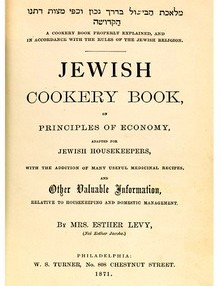
The Americana spring sale on March 18, conducted by Swann Galleries, the well-known New York auctioneer, attracted not only booklovers fond of antique Arkansas travel guides or provincial manuscript collectors but Jewish scholars as well. There were four Judaica lots there, and one of them, Liber Psalmorum Hebraice, the first book in the U.S. printed in Hebrew in 1809, was rated second. The top lot though was the Jewish Cookery Book, by Mrs. Esther Levy. It was the first Jewish cookbook in the United States, printed in Philadelphia, in 1871. Booknik reporter Lesya Bobrova describes this rarity in detail.
Country Girl, Come to My Kitchen
It is easy to doubt the existence of Israeli rural cuisine for it calls for centuries old uninterrupted tradition of living in villages, and in Israel, it was revitalized only about 130 years ago. Moreover, the rural population does not differ from the urban one much. This is why the phrase “rural cuisine” in Israel sounds nostalgic for the Galut past, and the Rural Cuisine Festival that took place in early March was in fact a cooking extravaganza for the “world cuisine.” Booknik’s Israeli reporter Ariel Bulstein went there in search of a rural cooking tradition.
…and many other remarkable recipes in the Events & Reports section.
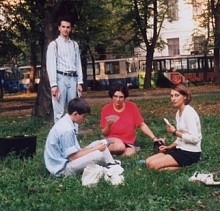
We’ve learned accounting and mathematical analysis, we’ve bought sensible shoes and warm coats, we’ve found good jobs, and we’ve gotten new family cars. Our children turned out to be fortunate, and we’ve sent them to prestigious Moscow schools. We book concert tickets six months before the event, we buy clothes at seasonal sales, and we seriously discuss the TV screen size. If we go to a fashionable restaurant, you always order pizza, I always order rolls, and then we both get immersed in our separate books. However, what is the name of that force that makes people act wonderfully? Here I am, mysterious and controversial, working my ladle spoon, flipping pancakes professionally, and methodically dusting CDs. And here you are, watching that hateful Amelie instead of your beloved Simpsons, buying bitter chocolate instead of milk chocolate, and meringue instead of biscuit. What makes you do it? I still remember it, you’ve always hated meringues. Why do I live with this taciturn cynic, why do you bear with this extravagant hussy? I suddenly realize that this force must be called love. Booknik contributor Alexandra Dovlatova-Mechik, our observant traveler of the week, writes her letter from Moscow.
Pesach Customs: An Erotic Egyptian Dance, Charoset with No Bricks, and the Seder for Libyans and Ethiopians
One of the most important holidays is nigh. More than the rest of them, it is characterized by various snaggles. The consolation is that those snaggles are our own, Jewish ones. Bread is banned. All utensils are washed in boiling water. In the stores, all farinaceous food is covered with plastic but there are frozen loaves in fridges. House cleaning is personal heroics. Matzah is purchased by 2.5-kilo cartons even by those who are on a diet. And there are unending TV shows on how to cook something edible with no flour in it. Booknik contributor Keren Pevzner sticks to rules, and teaches Booknik readers to cook charoset.
…and many other edifying edibles in the Columns & Columns section.
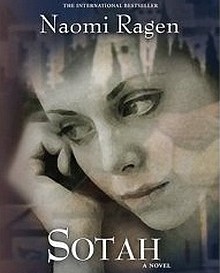
Booknik proudly publishes an excerpt from the novel by the American-Israeli author Naomi Ragen that tells a heart-rending, and intricately woven story of marital difficulties in the ultra-orthodox world.
…and many other tailspin tales in the Stories & Essays section.
Don’t Grudge the Brew 40: A Hot Friendship
Once upon a time Fatty Cream met Egg Yolk. They have not seen each other for ages, so they decided to go to the baths. Why not? They are old friends, they haven’t seen each other for ages. Once there, they were treated to a good birching with a whisk, placed into small glass bowls, and sent to a steam bath. After that, they were put out in the cold, into an industrial strength freezer. Or a usual house refrigerating appliance served just as well. Booknik’s charming chef Roman Gershuni tells and shows you what happened to them next. The happy conclusion is this: there are no more Fatty Cream, no more Egg Yolk but there is — ta-DAMM! — Crème Brûlée.
The History of Israel in Hebrew 2. What Did You Do for Your Country?
“You only talk three years. What do you did in the country? What do you did for the country? Only talk all time. Idiot!” Booknik’s video historiographer Arkan Kariv tells about that fateful speech by the Knesset member Flatto-Sharon.
…and many other visual victuals in the Video Blog section.

For Seder, the main dish is the Seder Plate. Only symbolic food is placed there, not just everything you can grab. It includes Z’roa, Beitzah, Maror, Charoset, Karpas, and Chazeret. And Matzah, of course, at a separate plate. Every ingredient has a very deep meaning, and the way you cook it is also important. Yelizaveta Guller explains what all those wonderful names mean.
Why Is This Night Different from Any Other Night?
The most expected Jewish spring holiday is coming, Pesach. It is not meant for lazybones. Everyone in the household has a task, cleaning, cooking, and buying outfits for the whole family. But this entire bustle is not nearly enough. The holiday should be merry, and last for many hours. Everyone should sing. Zhenya Lopatnik teaches our not-especially-grown-up readers what to sing on Pesach.
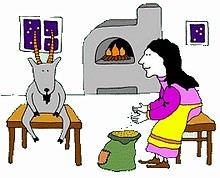
“Father called the entire town to his feast, but he forgot to invite that old woman who lived at the edge of town. And that old woman was a witch. So she cursed his newborn boy—” Booknik Jr. publishes the Jewish folktale that ends well, translated from Yiddish by Valery Dymshitz.
You Have Not Seen It Even in a Dream
Beautiful Stories from Shakespeare, by Edith Nesbit
Some people think that classic lit is booooring. It’s ancient mossy crap that you have to learn ‘cause you have to learn it. So. Classic lit is really COOL. The down part of it is that sometimes it’s— well, unpalatable. Natch, it’s been around for a long time, it could become a little stale. I will look at you in a hundred years. Yan Shapiro now tells us how cool it is to read Shakespeare. It’s old news, of course, but there’s no harm in reminding. Shakespeare rocks.

Belka & Strelka. Star Dogs, directed by Svyatoslav Ushakov
If you want to see how Moscow looked like in pre-historic times, that is, in the 1960s, you should see this film. You will learn that people were uncommon in this country, but small furry animals abounded. Those animals could talk, sing songs, tell jokes, fall in love, make friends, argue, and even fight with each other. They could do things, both nice, and not very nice. Elephants were pink, and some birds were blue. Iraida Stepnova will tell you about this 3D cartoon something else but not all of it, not to spoil the fun.
Mom, Give Me a Sister! Notes of a Crazed Parent
All advanced parents know about children’s jealousy, and start feeling pangs of guilt beforehand, imagining what torture they could bring to their kid by planning a little brother or sister for him or her. “Sometimes my own children,” Lena Shapiro writes, “are far from being glad to have siblings, they could fight, and mock each other or they just want to be left alone. But when I asked my eldest son if he would have preferred to be the only son, his answer was firm, ‘No!’ So now, my youngest is four years old. He goes to his preschool, I go on with my studies, and dream of visiting America, my husband would like to travel, too, and we have our grand plans. But our five adorable kids look at other families with new babies, and say, ‘Why can’t we have one, too?’ “Mom, give us a sister!’ ‘No, two sisters! And two puppies!’”
…and many other charming characters at Booknik Jr., also known as Family Booknik, our own web site for kids, and those other kids who are called “parents”.
Power to the People! Booknik and Family Booknik are supported by the AVI CHAI Foundation.









